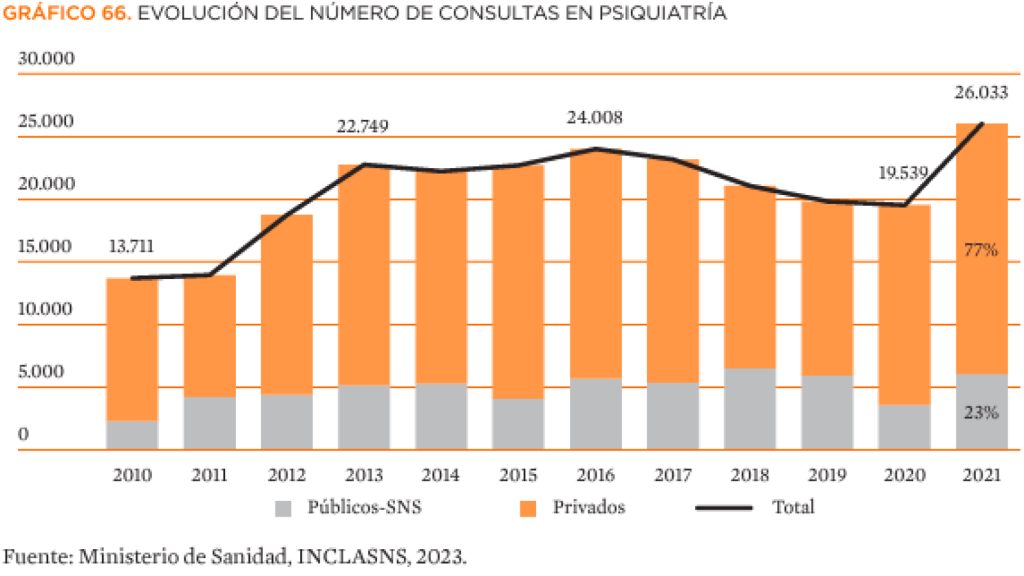cost 4.2% of GDP and 77% of private sector consultations

Mental health problems are on the rise it has worsened over the past decade during the Covid-19 pandemic. The rise in anxiety disorders, depression and post-traumatic stress disorder, as well as the rise in self-harming behavior since 2020, has made clear the link between the health crisis and the deterioration of society’s mental health.
Currently, 34% of the Spanish population suffers from some mental health problem, the most common of which are anxiety disorders, sleep disorders and depressive disorders. Disorders costing 4.2% of GDPThis is evidenced by OECD estimates included in the report on the current state of the national health system prepared by the Economic and Social Council of Spain (CES).
In the European Union, the total cost of mental health problems is 4% of GDP member countries. Thus, 190 billion euros are allocated for health care and 170 billion euros for social security programs, to which we must add approximately €240 billion in indirect labor market costswhich is associated with a decrease in employment and a decrease in labor productivity.

Precisely, one of the areas that most affects the mental health of the citizens of our country is work, as Synergie España explains. Last year, the Ministry of Inclusion, Social Protection and Migration registered record 600,814 temporary sick leave due to mental health issues.
Additionally, more than 300,000 mental health-related waivers were signed in the first six months of 2024, representing an increase of 10% compared to last year.
Private healthcare, protagonist
The lack of resources allocated to mental health care in the NHS has led to the growth of the private sector in this area of care.
So, 8 out of 10 psychiatric consultations (77%) are carried out in private medical institutions.while the public system accounts for only 2 in 10 (23%), according to data compiled by the CES report.

The evolution of psychiatric consultations.
Some requests that have increased in number in recent years. In 2010 there were about 14,000, in 2021 they grew to 26,000. That is, consulting activity has almost doubled, with 77% coming from private healthcare, as mentioned earlier.
In this sense, the Economic and Social Council of Spain warns that “this distribution of total activity, which involves costs for the majority of patients, could lead to a situation reverse carethose who need it most receive less attention, as segments with fewer economic resources are those most at risk of mental health problems.
Lack of professionals
The increase in psychiatry consultations comes at a time when system resources in terms of specialized personnel are declining in Spain.
In particular, according to the latest Eurostat data, in our country the ratio of psychiatrists is 12 per 100,000 inhabitants. This figure is lower than in some countries such as Germany.where there are 28 psychiatrists per 100,000 inhabitants; or Greece and the Netherlandscountries where the ratio of mental health professionals is 25.
Ratio of psychiatrists per 100,000 inhabitants.
Despite this, The truth is that Spain has increased this figure.. In 2013, the ratio of psychiatrists was 10 per 100,000 inhabitants. However, it is still very far from the OECD average of 18 specialists per 100,000 people.
A situation that could get worse due to retirement this will happen in the coming years. To which is it added that In 2027, no psychiatrist will enter the labor market. given that the training of these specialists (known as the MIR system) in this medical specialty has been extended to five years.
therapeutic arsenal
To cope with mental health problems, patients sometimes have to resort to medication. “As pharmacological treatment is considered necessary as part of a comprehensive approach to health, it is equally important to ensure that responsible use of these medicinesso that its value is maximized,” explained Arancia Sancho, Director of Medical and Scientific Research at Farmaidustria.
Currently, the pharmaceutical industry is developing. more than 160 drugs against mental illness. The drugs being studied include 54 for depression, 35 for schizophrenia, 35 for anxiety disorders and 13 for bipolar disorders.
